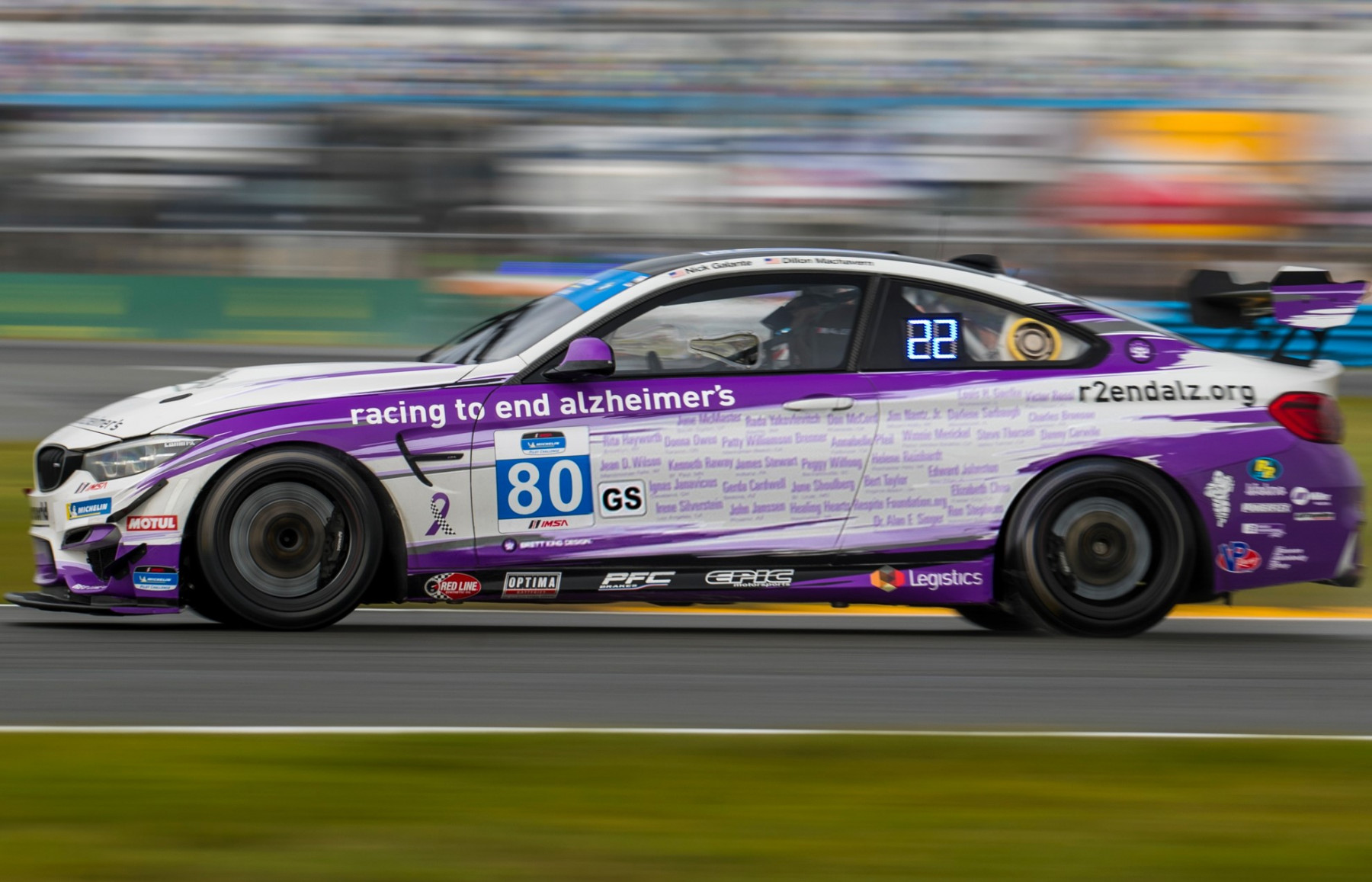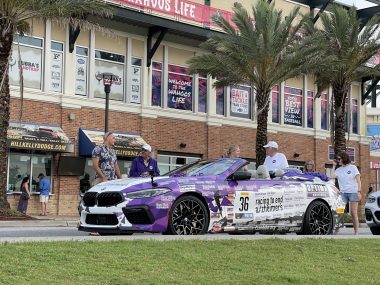Alzheimer’s Nonprofit Uses Race Cars to Raise Funds, Honor Patients
Written by |

Photo by Halston Pitman
A Racing to End Alzheimer's car competes, showing the names of people with Alzheimer's.
Phil Frengs is on a coast-to-coast mission to raise money and awareness for Alzheimer’s disease, always thinking of, and honoring, his wife Mimi, who was diagnosed with the condition in November 2013.
Frengs, a racing aficionado, is the president and CEO of Legistics, which specializes in document support services for law firms. His company sponsors race cars and emblazons its logo on the hood of racing BMWs.
On the blank surfaces of these BMW racing cars, Frengs saw another opportunity.
As he was on the track one day, “the little light went off,” Frengs, 70, said in a phone interview with Alzheimer’s News Today from his home in the greater Los Angeles area.
“Any sort of a race car is covered with company logos, because that’s who pays the bills. What would happen if we turned racing around a little bit? And the idea became something different,” Frengs said.
He’s now made room for decals of the names of people affected by Alzheimer’s on the doors of the race cars. It was an idea that sparked the organization he founded, Racing to End Alzheimer’s.
Now on a 9,000-mile road trip across the country, Frengs is driving a BMW M8, provided by BMW North America. He’s making stops at BMW dealerships, meeting families whose names adorn his vehicle, and presenting checks at the Alzheimer’s centers his organization is helping to fund.
He’s halfway through the journey, which started June 22 at the Pikes Peak International Hill Climb in Colorado, and has zig-zagged his way through the U.S. He will end the trip Aug. 28-29 at the Road America track in Wisconsin.
On the Road Again 2: The Ultimate Tour for the Cure road trip, derived from BMW’s Ultimate Driving Machine slogan, has been a way for Frengs to garner awareness through word of mouth, and an opportunity to grow his organization’s social media following, which is up to nearly 18,000 followers on Facebook.
Racing to End Alzheimer’s is run by Frengs, his assistant, and a creative director, with Legistics paying the administrative and marketing expenses. Funds donated to the organization are made through the giver-directed California Community Foundation, which reduces the cost burden for the nonprofit.
Between the cars that compete in two series — the SRO Pirelli GT4 America championship and the IMSA Michelin Pilot Challenge — patient names have circled 14 different racetracks so far. NBC Sports will broadcast the upcoming Michelin Pilot Challenge competition.
In the last racing season, Frengs said the organization had added 154 names of people affected by Alzheimer’s on its competition car. He’s hoping to beat that record again by the end of November, when the cars pull into the garage for the off-season. The current count is 102 names.
Legistics, which Frengs started 32 years ago, matches every donation. While $250 gets a family member’s name on the cars, people also can donate $100 for two custom wristbands with the honoree’s name, or $1,000, which also adds the name of someone else who can’t afford a $250 donation. Of course, any amount in between also is welcome, Frengs says. If a person is unable to make any donation, they can contact Racing to End Alzheimer’s for a chance to display their loved one’s name on the livery.
Since its start in 2017, and through the end of the last racing season, the organization has raised $400,000 for Alzheimer’s research and care. The funds have been split between the Nantz National Alzheimer Center at Houston Methodist, in Texas, and the UCLA Alzheimer’s and Dementia Care Program, in California, where Frengs’ wife underwent advanced diagnostics after her diagnosis.
“It’s very easy to feel helpless because there’s no happy ending to this disease,” Frengs said. “By having this interest and this ability to be with people on a regular basis and to have the racing be something that’s doing good in and around the disease is actually very fulfilling.”

Phil Frengs shows off the BMW M8 covered with the names of people with Alzheimer’s at Admiral Fetterman Field, the home park of the Pensacola Blue Wahoos, a minor league baseball team. (Photo by Patrick Barrett)
Frengs’ current road trip is his second around the country. Last year, when COVID-19 put the racing schedule on hold, he decided he needed to come up with a way to honor the people who would have had their names on the car for the racing season. That’s when he came up with the idea of a nationwide road trip.
He drove a few laps on the Daytona 500 track in Florida before driving 4,500 miles to the finish line on the WeatherTech Raceway Laguna Seca in Monterey, California, in a BMW M4 covered with the names of Alzheimer’s patients.
After each leg of the trip, he returns to his home in Los Angeles for a few days to check on Mimi, who now requires full-time care. The vehicle is stored for two to three days in a BMW showroom while he travels back and forth.
The seven years since Mimi’s diagnosis have been up and down, Frengs said. While Mimi is no longer able to speak, she has retained her sense of humor.
In the first two years, Mimi showed slow cognitive decline, according to Frengs. However, shortly thereafter, she began showing severe symptoms, becoming frustrated and angry. After spending all his time caring for her and witnessing the course of the disease, Frengs decided to hire a staff of caregivers. That allows him to spend more personal time with Mimi, and to raise awareness and money for Alzheimer’s, and run his company.
It also was around that time that Frengs came up with the idea of Racing to End Alzheimer’s. Balancing Mimi’s care, his job, and the organization is a lot of work, but Frengs said it’s all worth it.
“Being able to do this in honor of my wife and help all the other people that are going through similar circumstances, it just seems like really the right thing to do,” he said. “And it gives me a lot of satisfaction that I’m able to do it.”






